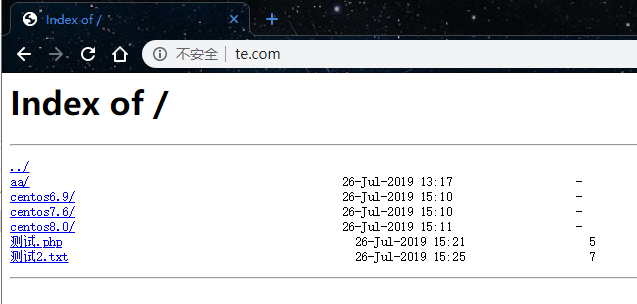Nginx网站部署
Nginx网站服务部署
常用的网站服务软件
处理静态资源的服务:
apache软件:https://apache.org/
nginx软件:https://nginx.org/
处理动态资源的服务:
PHP(超文本预处理器):https://php.net 终端浏览器进行访问
Tomcat(java):利用移动端查看网页
python:开发难度比较低
nginx服务的软件特点
Nginx因具有高并发(特别是静态资源)、占有系统资源少等特性,Nginx不但是一个优秀的Web服务软件,还具有反向代理负载均衡功能和缓存服务功能。
1)支持高并发,消耗内存资源少
2)具有多种功能
网站web服务功能 --- apache
网站负载均衡功能 --- LVS
网站缓存服务 --- Squid
3)在多个系统平台都可以进行部署
nginx实现网络通讯时使用的是异步网络IO模型:eoll模型(aoache -- select模型)
| 指标 | select | epoll |
|---|---|---|
| 性能 | 随着连接数的增加性能急剧下降,处理成千上万并发连接数,性能很差 | 随着连接数的增加,性能基本上没有下降,处理成千上万并发连接时,性能很好 |
| 连接数 | 连接数有限制,处理的最大连接数不超过1024,如果要处理的连接数超过1024个,则需要修改FD_SETSIZE宏,并重新编译 | 连接数无限制 |
| 内在处理机制 | 线性轮询 | 回调callback |
| 开发复杂性 | 低 | 中 |
Nginx采用Epool网络模型,Apache采用select选择模型
select:当用户发起一次请求,选择模型就会进行一次遍历扫描,从而导致性能低下
Empool:当用户发起请求,epool模型会直接进行处理,效率高效,并无连接限制
nginx软件的安装部署过程
两种安装方式:
01.yum安装软件
a.使用官方yum源进行安装---安装的时最新版本--软件目录结构比较标准(推荐)
b.使用非官方yum源进行安装---安装的不是最新版本---目录结构会发生变化
02.编译安装软件
第一个步骤:
[root@web02 tools]# wget https://nginx.org/download/nginx-1.16.0.tar.gz
#PS:解决软件的依赖
第二个步骤:
解压下载好的软件,并进入到软件目录中
a.进行配置操作
[root@web02 tools]# tar xf nginx-1.16.0.tar.gz
[root@web02 tools]# cd nginx-1.16.0/
[root@web02 nginx-1.16.0]# ./configure --help
--prefix=PATH set installation prefix
#指定程序安装路径
--user=USER set non-privileged user for worker processes
#设置一个虚拟用户管理worker进程(安全)
--group=GROUP set non-privileged group for worker processes
#设置一个虚拟用户组管理worker进程(安全)
--with #添加模块
--without #卸载模块
b.进行软件的编译过程
make 编译
C(英国人) 代码(任务文件) 系统识别 翻译 系统(中国人)处理代码
翻译效率比较低 翻译官(gcc)
python(日本人) 代码(任务文件) 系统识别 翻译 系统(中国人)处理代码
翻译效率比较高 翻译官(python解释器)
c.编译安装过程
make install
编译安装方法
创建WWW用户
[root@web01 ~]# groupadd www -g 666
[root@web01 ~]# useradd www -s /sbin/nologin -M -u 666 -g 666
[root@web01 ~]# id www
uid=666(www) gid=666(www) 组=666(www)
安装依赖包
[root@web01 ~]# yum install openssl-devel pcre-devel gcc gcc+ -y
下载解压软件包
[root@web01 ~]# mkdir /data/soft -p
[root@web01 ~]# cd /data/soft/
[root@web01 /data/soft]# wget http://nginx.org/download/nginx-1.16.0.tar.gz
[root@web01 /data/soft]# tar zxvf nginx-1.16.0.tar.gz
配置编译参数
[root@web01 ~]# cd /data/soft/nginx-1.16.0/
[root@web01 /data/soft/nginx-1.16.0]# ./configure --help
[root@web01 /data/soft/nginx-1.16.0]# ./configure --user=www --group=www --prefix=/opt/nginx-1.16.0/ --with-http_stub_status_module --with-http_ssl_module --with-pcre
编译安装
[root@web01 /data/soft/nginx-1.16.0]# make && make install
创建软链接
[root@web01 /data/soft/nginx-1.16.0]# ln -s /opt/nginx-1.16.0/ /opt/nginx
[root@web01 /data/soft/nginx-1.16.0]# ls -lh /opt/
总用量 4.0K
lrwxrwxrwx 1 root root 18 7月 29 20:27 nginx -> /opt/nginx-1.16.0/
drwxr-xr-x 11 1001 1001 4.0K 7月 29 20:26 nginx-1.16.0
检查语法
[root@web01 /opt/nginx]# /opt/nginx/sbin/nginx -t
nginx: the configuration file /opt/nginx-1.16.0//conf/nginx.conf syntax is ok
nginx: configuration file /opt/nginx-1.16.0//conf/nginx.conf test is successful
启动nginx的
[root@web01 /opt/nginx]# /opt/nginx/sbin/nginx
检查测试
[root@web01 /opt/nginx]# netstat -lntup|grep nginx
tcp 0 0 0.0.0.0:80 0.0.0.0:* LISTEN 12828/nginx: master
[root@web01 /opt/nginx]# curl 10.0.1.7
yum官方源安装方法:
第一个历程:更新nginx官方yum源
[root@web01 ~]# vim /etc/yum.repos.d/nginx.repo
[nginx-stable]
name=nginx stable repo
baseurl=http://nginx.org/packages/centos/$releasever/$basearch/
gpgcheck=1
enabled=1
gpgkey=https://nginx.org/keys/nginx_signing.key
解释
[nginx-stable] #描述
name=nginx stable repo #名称
baseurl=http://nginx.org/packages/centos/$releasever/$basearch/ #下载地址
gpgcheck=1 #检查,验证软件的合法性,如果验证不通过改为0
enabled=1 #是否启用源
gpgkey=https://nginx.org/keys/nginx_signing.key
第二个历程:yum安装nginx软件
[root@web01 ~]# yum -y install nginx
第三个历程:启动nginx服务
[root@web01 ~]# systemctl start nginx
[root@web01 ~]# systemctl enable nginx
Created symlink from /etc/systemd/system/multi-user.target.wants/nginx.service to /usr/lib/systemd/system/nginx.service.
测试访问nginx是否安装成功

nginx软件的目录结构
/etc/logrotate.d/nginx #实现nginx日志文件定时切割处理
/etc/nginx
/etc/nginx/nginx.conf #主配置文件
/etc/nginx/conf.d
/etc/nginx/conf.d/default.conf #扩展配置文件
/var/log/nginx #日志文件
/usr/share/nginx/html #站点目录(保存图片、附件信息、音频、视频)
/etc/nginx/fastcgi_params #接口相关配置文件
/etc/nginx/scgi_params #接口相关配置文件
/etc/nginx/uwsgi_params #接口相关配置文件
/etc/nginx/koi-utf #字符编码相关配置文件
/etc/nginx/koi-win #字符编码相关配置文件
/etc/nginx/win-utf #字符编码相关配置文件
/etc/nginx/mime.types #媒体资源文件类型文件
/usr/lib/systemd/system/nginx-debug.service #nginx服务守护进程管理文件
/usr/lib/systemd/system/nginx.service #nginx服务守护进程管理文件
/etc/nginx/modules #模块目录文件
/usr/lib64/nginx #模块目录文件
/usr/lib64/nginx/modules #模块目录文件
/usr/sbin/nginx #nginx命令文件
/usr/sbin/nginx-debug #nginx命令文件
专用文件切割程序--logrotate
[root@web01 ~]# cat /etc/logrotate.conf
# see "man logrotate" for details
# rotate log files weekly
weekly --- 定义默认日志切割的周期
# keep 4 weeks worth of backlogs
rotate 4 --- 定义只保留几个切割后的文件
# create new (empty) log files after rotating old ones
create --- 创建出一个相同的源文件
# use date as a suffix of the rotated file
dateext --- 定义角标(扩展名称信息)
# uncomment this if you want your log files compressed
#compress --- 是否对切割后的文件进行压缩处理
# RPM packages drop log rotation information into this directory
include /etc/logrotate.d --- 加载包含/etc/logrotate.d目录中的文件配置
# no packages own wtmp and btmp -- we'll rotate them here
/var/log/wtmp { --- 单独对某个文件进行切割配置
monthly --- 定义日志切割的周期
create 0664 root utmp --- 创建出一个相同的源文件并定义属性
minsize 1M --- 最小大小为1M,小于1M不进行切割
rotate 1 --- 定义只保留几个切割后的文件
}
/var/log/btmp {
missingok
monthly
create 0600 root utmp
rotate 1
}
# system-specific logs may be also be configured here.
[root@web01 ~]#
nginx服务配置文件
/etc/nginx/nginx.conf ---主配置文件
[root@web01 ~]# cd /etc/nginx/
[root@web01 nginx]# cp nginx.conf{,.bak}
[root@web01 nginx]# grep -v '^$' nginx.conf.bak >nginx.conf
[root@web01 nginx]# cat nginx.conf
第一个部分:配置文件主区域配置
user nginx; --- 定义worker进程管理用户
#补充:nginx的进程
#master process:主进程---管理服务是否能够正常运行
#worker process:工作进程--处理用户的访问请求
worker_processes 1; --- 定义有几个worker进程 ==CPU核数 / 核数的2倍
error_log /var/log/nginx/error.log warn; --- 定义错误日志
pid /var/run/nginx.pid; --- 定义pid文件路径信息
第二个部分:配置文件事件区域
events {
worker_connections 1024; --- 一个worker进程可以同时接收1024访问请求
}
第三个部分:配置http区域
http {
include /etc/nginx/mime.types; --- 加载一个配置文件
default_type application/octet-stream; --- 指定默认识别文件类型
log_format main '$remote_addr - $remote_user [$time_local] "$request" ' --- 定义日志格式
'$status $body_bytes_sent "$http_referer" '
'"$http_user_agent" "$http_x_forwarded_for"';
access_log /var/log/nginx/access.log main; --- 指定日志路径(main:引用这个格式)
sendfile on;
#tcp_nopush on;
keepalive_timeout 65; ---超时时间
#gzip on; --- 开启压缩
include /etc/nginx/conf.d/*.conf; --- 加载一个配置文件
}
[root@web01 nginx]#
/etc/nginx/nginx.d/default ---扩展配置文件(虚拟主机配置文件)
[root@web01 nginx]# cd /etc/nginx/conf.d/
[root@web01 conf.d]#
[root@web01 conf.d]# cp default.conf{,.bak}
[root@web01 conf.d]# grep -Ev '^$|#' default.conf.bak >default.conf
[root@web01 conf.d]# vim default.conf
第四部分:server区域信息(配置一个网站)
server {
listen 80; --- 指定监听端口
server_name localhost; --- 指定网站域名
location / { ---
root /usr/share/nginx/html; --- 定义站点目录的位置
index index.html index.htm; --- 定义首页文件
}
error_page 500 502 503 504 /50x.html; --- 优雅显示页面信息
location = /50x.html {
root /usr/share/nginx/html; --- 指定站点目录
}
}
[root@web01 conf.d]#
Nginx服务的应用
第一个历程:编写虚拟主机配置文件
[root@web01 ~]# cd /etc/nginx/conf.d/
[root@web01 conf.d]# vim www.conf
server {
listen 80;
server_name www.test.com;
location / {
root /usr/share/nginx/html;
index test.html;
}
}
第二个历程:编写代码
[root@web01 conf.d]# cd /usr/share/nginx/
[root@web01 html]# vim test.html
<html>a
<html>
<meta charset="utf-8">
ead>
▽title>test</title>
</head>
<body>
test,test
test,test
</html>
第三个历程:重启nginx服务(最好平滑重启)
两种重启方法(yum安装方式):
systemctl reload nginx
nginx -s reload
#查看看帮助
[root@web01 html]# nginx -h
nginx version: nginx/1.16.0
Usage: nginx [-?hvVtTq] [-s signal] [-c filename] [-p prefix] [-g directives]
Options:
-?,-h : this help
-v : show version and exit
-V : show version and configure options then exit
-t : test configuration and exit --- 检查测试配置文件语法
-T : test configuration, dump it and exit
-q : suppress non-error messages during configuration testing
-s signal : send signal to a master process: stop, quit, reopen, reload --- 控制服务停止启动
-p prefix : set prefix path (default: /etc/nginx/)
-c filename : set configuration file (default: /etc/nginx/nginx.conf)
-g directives : set global directives out of configuration file
[root@web01 html]#
第四个历程:打开浏览器访问

访问过程

部署网站常见错误
1.网站服务配置文件编写不正确
#404错误
解决方法一:修改nginx配置文件---location
解决方法二:在站点目录中创建相应目录或文件数据信息
#403错误
解决方法一:不要禁止访问
解决方法二:因为没有首页文件
2.DNS信息配置不正确
3.nginx配置文件修改一定要重启服务;站点目录中代码文件信息调整,不需要重启服务
利用Nginx服务搭建多个网站
第一个给历程:创建多个虚拟主机配置文件
[root@web01 conf.d]# cat bbb.conf
server {
listen 80;
server_name bbb.test.com;
location / {
root /html/bbb;
index index.html;
}
}
[root@web01 conf.d]# cat www.conf
server {
listen 80;
server_name www.test.com;
location / {
root /html/www;
index index.html;
}
}
[root@web01 conf.d]# cat ccc.conf
server {
listen 80;
server_name ccc.test.com;
location / {
root /html/ccc;
index index.html;
}
}
[root@web01 conf.d]#
[root@web01 conf.d]# systemctl restart nginx
第二个历程:创建站点目录和首页文件
[root@web01 conf.d]# for i in {www,bbb,ccc};do echo "10.0.0.7 $i.test.com" > /html/$i/index.html;done
[root@web01 conf.d]# for i in {www,bbb,ccc};do cat /html/$i/index.html ;done
10.0.0.7 www.test.com
10.0.0.7 bbb.test.com
10.0.0.7 ccc.test.com
[root@web01 conf.d]#
第三个历程:访问测试
Windows访问:

Linux访问
[root@web01 conf.d]# curl www.test.com
10.0.0.7 www.test.com
[root@web01 conf.d]# curl bbb.test.com
10.0.0.7 bbb.test.com
[root@web01 conf.d]# curl ccc.test.com
10.0.0.7 ccc.test.com
[root@web01 conf.d]#
虚拟主机访问方式
a.基于域名的方式进行访问
b.基于地址的方式进行访问(只能用指定地址进行访问)
[root@web01 conf.d]# vim www.conf
server {
listen 10.0.1.7:80; ---只允许10.0.1.7地址访问
server_name www.test.com;
location / {
root /html/www;
index index.html;
}
}
[root@web01 conf.d]# vim ../nginx.conf
user nginx;
worker_processes 2;
error_log /var/log/nginx/error.log warn;
pid /var/run/nginx.pid;
events {
worker_connections 1024;
}
http {
include /etc/nginx/mime.types;
default_type application/octet-stream;
log_format main '$remote_addr - $remote_user [$time_local] "$request" '
'$status $body_bytes_sent "$http_referer" '
'"$http_user_agent" "$http_x_forwarded_for"';
access_log /var/log/nginx/access.log main;
sendfile on;
#tcp_nopush on;
keepalive_timeout 65;
#gzip on;
include /etc/nginx/conf.d/www.conf;
#include /etc/nginx/conf.d/*.conf;
}
[root@web01 conf.d]# systemctl restart nginx
[root@web01 conf.d]# netstat -lntup | grep 80
tcp 0 0 10.0.1.7:80 0.0.0.0:* LISTEN 12365/nginx: master
[root@web01 conf.d]#
[root@web01 conf.d]# grep 7 /etc/sysconfig/network-scripts/ifcfg-eth[01]
/etc/sysconfig/network-scripts/ifcfg-eth0:IPADDR=10.0.1.7
/etc/sysconfig/network-scripts/ifcfg-eth1:IPADDR=172.16.1.7
[root@web01 conf.d]# curl 10.0.1.7
10.0.0.7 www.test.com
[root@web01 conf.d]# curl 172.16.1.7
curl: (7) Failed connect to 172.16.1.7:80; Connection refused
[root@web01 conf.d]#
#PS:服务配置文件中涉及到地址修改,必须重启nginx服务,不能平滑重启
c.基于端口的方式进行访问
[root@web01 conf.d]# vim www.conf
server {
listen 8080;
server_name www.test.com;
location / {
root /html/www;
index index.html;
}
}
[root@web01 conf.d]# vim ../nginx.conf
user nginx;
worker_processes 2;
error_log /var/log/nginx/error.log warn;
pid /var/run/nginx.pid;
events {
worker_connections 1024;
}
http {
include /etc/nginx/mime.types;
default_type application/octet-stream;
log_format main '$remote_addr - $remote_user [$time_local] "$request" '
'$status $body_bytes_sent "$http_referer" '
'"$http_user_agent" "$http_x_forwarded_for"';
access_log /var/log/nginx/access.log main;
sendfile on;
#tcp_nopush on;
keepalive_timeout 65;
#gzip on;
#include /etc/nginx/conf.d/www.conf;
include /etc/nginx/conf.d/*.conf;
}
[root@web01 conf.d]# systemctl restart nginx
[root@web01 conf.d]# netstat -lntup | grep 80
tcp 0 0 0.0.0.0:8080 0.0.0.0:* LISTEN 12418/nginx: master
tcp 0 0 0.0.0.0:80 0.0.0.0:* LISTEN 12418/nginx: master
windows访问

网站页面的访问原理
1.将域名进行解析 www.test.com --- 10.0.1.7
2.建立TCP的连接(四层协议)
10.0.1.7 --- 目标端口 --- 8080
3.根据应用层HTTP协议发出请求
请求报文:hosts:www.test.com
4.没有相同域名的server主机,会找满足端口要求的第一台主机
显示主机的网站页面
安全的访问配置
a.根据用户访问的地址进行控制
10.0.1.0/24 www.test.com/aa/ 不能访问
172.16.1.0/24 www.test.com/aa 可以访问
nginx访问模块:ngx_http_access_module
#举例配置
location / {
deny 192.168.1.1;
allow 192.168.1.0/24;
allow 10.1.1.0/16;
allow 2001:0db8::/32;
deny all;
}
#指令语法
Syntax: allow address | CIDR | unix: | all; --- 语法格式
Default: —
Context: http, server, location, limit_except --- 可以配置的区域
编写配置文件
[root@web01 www]# vim /etc/nginx/conf.d/www.conf
server {
listen 80;
server_name www.test.com;
location / {
root /html/www;
index index.html;
}
location /aa {
root /html/www;
index index.html;
deny 10.0.1.0/24;
allow 172.16.1.0/24;
}
}
[root@web01 conf.d]# mkdir /html/www/aa
[root@web01 conf.d]# cd /html/www/
[root@web01 www]# ll
total 4
drwxr-xr-x 2 root root 6 Jul 26 21:16 aa
-rw-r--r-- 1 root root 22 Jul 26 20:32 index.html
[root@web01 www]# echo "www-test" >aa/test.html
[root@web01 www]#
[root@web01 www]# systemctl restart nginx
#补充:
location外面的信息,全局配置信息
location里面的信息,局部配置信息
b.根据用户访问进行认证
Nginx认证模块:ngx_http_auth_basic_module
#举例配置
location / {
auth_basic "closed site"; --- 开启认证功能
auth_basic_user_file conf/htpasswd; --- 加载用户密码文件(默认没有)
}
编写虚拟主机配置文件
[root@web01 www]# vim /etc/nginx/conf.d/www.conf
server {
listen 80;
server_name www.test.com;
location / {
root /html/www;
index index.html;
auth_basic "www";
auth_basic_user_file passwd/htpasswd;
}
}
[root@web01 www]# systemctl restart nginx
创建密码文件(文件中密码信息必须是密文密码)
#htpasswd ---创建一个有密文信息的密码文件
[root@web01 www]# yum -y install httpd-tools
[root@web01 www]# htpasswd --help
Usage:
htpasswd [-cimBdpsDv] [-C cost] passwordfile username
htpasswd -b[cmBdpsDv] [-C cost] passwordfile username password
htpasswd -n[imBdps] [-C cost] username
htpasswd -nb[mBdps] [-C cost] username password
-c Create a new file. --- 创建一个密码文件
-n Don't update file; display results on stdout. --- 不会更新文件;显示文件内容信息
-b Use the password from the command line rather than prompting for it.
--- 免交互方式输入密码信息
-i Read password from stdin without verification (for script usage).
读取密码信息采用标准输入方式,并不做检查
-m Force MD5 encryption of the password (default). --- md5的加密算法
-B Force bcrypt encryption of the password (very secure). --- 使用bcrypt对密码进行加密
-C Set the computing time used for the bcrypt algorithm --- 使用bcrypt algorithm对密码进行加密
(higher is more secure but slower, default: 5, valid: 4 to 31).
-d Force CRYPT encryption of the password (8 chars max, insecure). --- 加密方式
-s Force SHA encryption of the password (insecure). ---加密方式
-p Do not encrypt the password (plaintext, insecure). ---不进行加密
-D Delete the specified user. --- 删除指定用户
-v Verify password for the specified user. --- 验证指定用户的密码
[root@web01 www]#
[root@web01 passwd]# htpasswd -bc ./htpasswd test 123456
Adding password for user test
[root@web01 passwd]# cat htpasswd
test:$apr1$NrNewMZd$01YYhppylGl6xuEj9wGom/
[root@web01 passwd]#
windows访问


当修改密码文件权限为600
#属主是root
[root@web01 passwd]# chmod 600 htpasswd
[root@web01 passwd]# ll
total 4
-rw------- 1 root root 43 Jul 26 21:55 htpasswd
[root@web01 passwd]#

500 Internal Server Error
1.内部程序代码编写有问题
2.程序服务中文件权限不正确
#属主是www
[root@web01 passwd]# chown www.root htpasswd
[root@web01 passwd]# ll
total 4
-rw------- 1 www root 43 Jul 26 21:55 htpasswd
[root@web01 passwd]# ps -ef| grep nginx
root 12983 1 0 22:24 ? 00:00:00 nginx: master process /usr/sbin/nginx -c /etc/nginx/nginx.conf
www 12984 12983 0 22:24 ? 00:00:00 nginx: worker process
www 12985 12983 0 22:24 ? 00:00:00 nginx: worker process
root 12993 12040 0 22:26 pts/0 00:00:00 grep --color=auto nginx
[root@web01 passwd]#

linux中访问
[root@web01 passwd]# curl --help
-u, --user USER[:PASSWORD] Server user and password
[root@web01 passwd]# curl www.test.com -u test
Enter host password for user 'test':
10.0.0.7 www.test.com
[root@web01 passwd]# curl www.test.com -u test:123456
10.0.0.7 www.test.com
[root@web01 passwd]#
用户的映射关系

利用Nginx服务搭建网站文件共享服务器
nginx模块功能:ngx_http_autoindex_module
location / {
autoindex on;
}
Syntax: autoindex on | off;
Default:
autoindex off;
Context: http, server, location
# autoindex 常用参数
autoindex_exact_size off;
默认为 on, 显示出文件的确切大小,单位是 bytes。
修改为 off,显示出文件的大概大小,单位是 kB 或者 MB 或者 GB。
autoindex_localtime on;
默认为 off,显示的文件时间为 GMT 时间。
修改为 on, 显示的文件时间为文件的服务器时间。
charset utf-8,gbk;
默认中文目录乱码,添加上解决乱码
编写配置文件
[root@web01 www]# vim /etc/nginx/conf.d/www.conf
server {
listen 80;
server_name www.test.com;
location / {
root /html/www;
# index index.html;
auth_basic "www";
auth_basic_user_file passwd/htpasswd;
autoindex on;
}
}
[root@web01 www]# tree
.
├── aa
│ └── test.html
├── centos6.9
│ └── centos6.9.php
├── centos7.6
│ └── centos7.6.php
└── centos8.0
└── centos8.0.php
4 directories, 4 files
[root@web01 www]#
#PS:
1.需要将首页文件删除,因为默认会加载首页文件
2.mime.types媒体资源类型文件作用
文件中有的扩展名信息资源,进行访问时会直接看到数据信息
文件中没有的扩展名信息资源,进行访问时会直接下载资源
网站页面目录数据,中文出现乱码问题解决
nginx功能模块:ngx_http_charset_module
[root@web01 www]# vim /etc/nginx/conf.d/www.conf
server {
listen 80;
server_name www.test.com;
location / {
root /html/www;
# index index.html;
auth_basic "www";
auth_basic_user_file passwd/htpasswd;
autoindex on;
charset utf-8; --- 修改目录结构中出现的中文乱码问题
}
}
利用nginx服务搭建配置文件别名功能
编写配置文件
[root@web01 www]# vim /etc/nginx/conf.d/www.conf
server {
listen 80;
server_name www.test.com te.com;
location / {
root /html/www;
index index.html;
auth_basic "www";
auth_basic_user_file passwd/htpasswd;
autoindex on;
charset utf-8;
}
}
[root@web01 www]# systemctl reload nginx
配置好解析信息
[root@web01 www]# vim /etc/hosts
10.0.1.7 web01 www.test.com bbb.test.com ccc.test.com te.com

作用:
01.编写网站访问测试
02.定位要访问的网站服务器
利用nginx状态模块功能对网站进行监控
nginx的状态模块:ngx_http_stub_status_module
location = /basic_status {
stub_status;
}
编写配置文件
[root@web01 www]# cd /etc/nginx/conf.d/
[root@web01 conf.d]# vim state.conf
server {
listen 80;
server_name state.test.com;
stub_status;
}
[root@web01 conf.d]# systemctl restart nginx
windows访问

Active connections: 1 --- 激活的连接数信息
accepts --- 接收的连接数汇总(综合)
handled --- 处理的连接数汇总(综合)
requests --- 总计的请求数量(http协议请求)
Reading --- nginx服务读取请求报文的数量
Writing --- nginx服务响应报文信息数量
Waiting --- --- nginx队列机制,要处理(读取或者响应报文进行保存
Nginx日志功能配置
访问日志模块:ngx_http_log_module
/var/log/nginx/access.log
log_format main '$remote_addr - $remote_user [$time_local] "$request" ' --- 定义日志内容格式
'$status $body_bytes_sent "$http_referer" '
'"$http_user_agent" "$http_x_forwarded_for"';
access_log /var/log/nginx/access.log main; --- 调用日志格式
$remote_addr --- 显示用户访问源IP地址信息
$remote_user --- 显示认证的用户名信息
[$time_local] --- 显示访问网站时间
"$request" --- 请求报文的请求行信息
$status --- 用户访问网站状态码信息
$body_bytes_sent --- 显示响应的数据尺寸信息
"$http_referer" --- 记录调用网络资源的链接地址信息(防止用户盗链)
"$http_user_agent" --- 记录用户使用什么客户端软件进行访问页面
"$http_x_forwarded_for" --- 记录客户端 IP 地址
详细日志详细说明
#PS:日志文件信息需要做切割处理
错误日志模块:Core functionality
/var/log/nginx/error.log
Syntax: error_log file [level]; --- 指定错误日志路径及错误日志记录的级别
Default:
error_log logs/error.log error;
Context: main, http, mail, stream, server, location
#错误日志级别
debug --- 调试级别:服务运行的状态信息和错误信息详细显示 --- 信息越多
info --- 信息级别:只显示重要的运行信息和错误信息
notice --- 通知级别:更加重要的信息进行通知说明
warn --- 警告级别:可能出现了一些错误信息,但不影响服务运行
error --- 错误级别:服务运行已经出现了错误,信息需要进行修复 --- 推荐选择
crit --- 严重级别:必须尽快进行修改调整
alert --- 严重警告级别:既警告,而且必须进行错误修改
emerg --- 灾难级别:服务已经不能正常运行 --- 信息越少
[root@web01 nginx]# cat /etc/nginx/nginx.conf
error_log /var/log/nginx/error.log warn;
Nginx服务location作用说明
模块说明:ngx_http_core_module
location进行匹配(uri)
#错误页面优雅显示
location /abc {
root /html/www;
error_page 404 /error.html;
}

location详细配置
Syntax: location [ = | ~ | ~* | ^~ ] uri { ... }
location @name { ... }
Default: —
Context: server, location
location = / { --- 精确匹配(优先级01 最高)
[ configuration A ]
}
location / { --- 默认匹配(优先级05 最低)
[ configuration B ]
}
location /documents/ { --- 按照目录进行匹配(优先级04)
[ configuration C ]
}
location ^~ /images/ { --- 优先匹配/不识别uri信息中符号信息(优先级02)
[ configuration D ]
}
location ~* \.(gif|jpg|jpeg)$ { --- 不区分大小写进行匹配(优先级03)
[ configuration E ]
}
location语法介绍
location [=|^~|~|~*|!~|!~*|/] /uri/ { ...
}
location语法优先级

配置位置匹配规则实战
[root@web01 ~]# cat /etc/nginx/conf.d/01-www.conf
server {
listen 80;
server_name www.oldzhang.com;
root /usr/share/nginx/html/www;
location / {
return 200 "location / \n";
}
location = / {
return 200 "location = \n";
}
location /documents/ {
return 200 "location /documents/ \n";
}
location ^~ /images/ {
return 200 "location ^~ /images/ \n";
}
location ~* \.(gif|jpg|jpeg)$ {
return 200 "location ~* \.(gif|jpg|jpeg) \n";
}
access_log off;
}
测试位置匹配规则
#精确匹配=/
[root@web01 ~]# curl www.oldzhang.com
location =
#没有满足的请求,所以匹配了/
[root@web01 ~]# curl www.oldzhang.com/oldzhang.html
location /
#匹配了/documents
[root@web01 ~]# curl www.oldzhang.com/documents/oldboy.html
location /documents/
#没有满足的条件,匹配/
[root@web01 ~]# curl www.oldzhang.com/oldboy/documents/oldboy.html
location /
#正则匹配了文件名
[root@web01 ~]# curl www.oldzhang.com/oldboy.jpg
location ~* \.(gif|jpg|jpeg)
#~*匹配正则不区分大小写优先于/documents
[root@web01 ~]# curl www.oldzhang.com/documents/oldboy.jpg
location ~* \.(gif|jpg|jpeg)
#^~优先匹配于~*
[root@web01 ~]# curl www.oldzhang.com/images/oldboy.jpg
location ^~ /images/
利用nginx实现页面跳转功能
利用rewrite模块实现跳转功能:ngx_http_rewrite_module
Syntax: rewrite regex replacement [flag]; --- rewrite 匹配的正则信息 替换成什么信息
Default: —
Context: server, location, if
rewrite ^/(.*) http://www.test.com/$1 permanent; --- 重写规则配置
#跳转方式
永久跳转:permanent 301 会将跳转信息进行缓存
临时跳转:redirect 302 不会缓存跳转信息
出现无限跳转解决
第一种方法:利用不同server区块配置打破循环
[root@web01 www]# vim /etc/nginx/conf.d/www.conf
server {
listen 80;
server_name test.com;
rewrite ^/(.*) http://www.test.com/$1 permanent;
}
server {
listen 80;
server_name www.test.com;
access_log /var/log/nginx/www_access.log main;
location / {
root /html/www;
index index.html;
}
}
第二种方法:利用if判断实现打破循环
[root@web01 www]# vim /etc/nginx/conf.d/www.conf
server {
listen 80;
server_name www.test.com test.com;
access_log /var/log/nginx/www_access.log main;
if ($host ~* "^test.com$") {
rewrite ^/(.*) http://www.test.com/$1 permanent;
}
location / {
root /html/www;
index index.html;
}
}
访问限制
经常会遇到这种情况,服务器流量异常,负载过大等等。对于大流量恶意的攻击访问,会带来带宽的浪费,服务器压力,影响业务,往往考虑对同一个ip的连接数,请求数,进行限制
.ngx_http_limit_conn_module模块可以根据定义的密钥来限制每个键值的连接数,如同一个IP来源的连接数
.limit_conn_module连接频率限制
limit_req_module请求频率限制
连接限制
配置语法
#模块名 ngx_http_limit_conn_module
Syntax: limit_conn_zone key zone=name:size;
Default: —
Context: http
Syntax: limit_conn zone number;
Default: —
Context: http, server, location
配置文件
# http 标签段定义连接限制
http{
limit_conn_zone $binary_remote_addr zone=conn_zone:10m;
}
# server标签里引用条件
[root@web01 ~]# cat /etc/nginx/conf.d/01-www.conf
server {
listen 80;
server_name www.oldzhang.com;
# 同一时刻只允许一个客户端连接
limit_conn conn_zone 1;
access_log /var/log/nginx/www.access.log main;
location / {
root /usr/share/nginx/html/www;
index index.html index.htm;
}
}
访问测试
[root@web01 ~]# yum install httpd-tools -y
[root@web01 ~]# ab -n 20 -c 2 http://www.oldzhang.com/
请求限制
配置语法
#模块名 ngx_http_limit_req_module
Syntax: limit_req_zone key zone=name:size rate=rate;
Default: —
Context: http
Syntax: limit_conn zone number [burst=number] [nodelay];
Default: —
Context: http, server, location
配置文件
http {
limit_req_zone $binary_remote_addr zone=req_zone:10m rate=1r/s;
}
[root@web01 ~]# cat /etc/nginx/conf.d/01-www.conf
server {
listen 80;
server_name www.oldzhang.com;
limit_req zone=req_zone burst=3 nodelay;
access_log /var/log/nginx/www.access.log main;
location / {
root /usr/share/nginx/html/www;
index index.html index.htm;
}
}
访问测试
[root@web01 ~]# yum install httpd-tools -y
[root@web01 ~]# ab -n 20 -c 2 http://www.oldzhang.com/
查看访问日志
[root@web01 ~]# tail -f /var/log/nginx/www.access.log
10.0.1.7 - - [30/Jul/2019:19:34:48 +0800] "GET / HTTP/1.0" 200 4 "-" "ApacheBench/2.3" "-"
10.0.1.7 - - [30/Jul/2019:19:34:48 +0800] "GET / HTTP/1.0" 200 4 "-" "ApacheBench/2.3" "-"
10.0.1.7 - - [30/Jul/2019:19:34:48 +0800] "GET / HTTP/1.0" 200 4 "-" "ApacheBench/2.3" "-"
10.0.1.7 - - [30/Jul/2019:19:34:48 +0800] "GET / HTTP/1.0" 200 4 "-" "ApacheBench/2.3" "-"
10.0.1.7 - - [30/Jul/2019:19:34:48 +0800] "GET / HTTP/1.0" 503 197 "-" "ApacheBench/2.3" "-"
10.0.1.7 - - [30/Jul/2019:19:34:48 +0800] "GET / HTTP/1.0" 503 197 "-" "ApacheBench/2.3" "-"
查看错误日志
[root@web01 ~]# tail -f /var/log/nginx/error.log
2019/07/30 19:34:48 [error] 17380#17380: *32 limiting requests, excess: 3.998 by zone "req_zone", client: 10.0.1.7, server: www.oldzhang.com, request: "GET / HTTP/1.0", host: "www.oldzhang.com"
2019/07/30 19:34:48 [error] 17380#17380: *33 limiting requests, excess: 3.998 by zone "req_zone", client: 10.0.1.7, server: www.oldzhang.com, request: "GET / HTTP/1.0", host: "www.oldzhang.com"
2019/07/30 19:34:48 [error] 17380#17380: *34 limiting requests, excess: 3.998 by zone "req_zone", client: 10.0.1.7, server: www.oldzhang.com, request: "GET / HTTP/1.0", host: "www.oldzhang.com"
2019/07/30 19:34:48 [error] 17380#17380: *35 limiting requests, excess: 3.997 by zone "req_zone", client: 10.0.1.7, server: www.oldzhang.com, request: "GET / HTTP/1.0", host: "www.oldzhang.com"
为什么限制请求的效果更好
我们先来回顾一下http协议的连接与请求,首先HTTP是建立在TCP基础之上,在完成HTTP请求需要先建立TCP三次握手(称为TCP连接),在连接的基础上在完成HTTP的请求。
所以多个HTTP请求可以建立在一次TCP连接之上,那么我们对请求的精度限制,当然比对一个连接的限制会更加的有效,因为同一时刻只允许一个TCP连接进入,但是同一时刻多个HTTP请求可以通过一个TCP连接进入。所以针对HTTP的请求限制才是比较优的解决方案。


 浙公网安备 33010602011771号
浙公网安备 33010602011771号